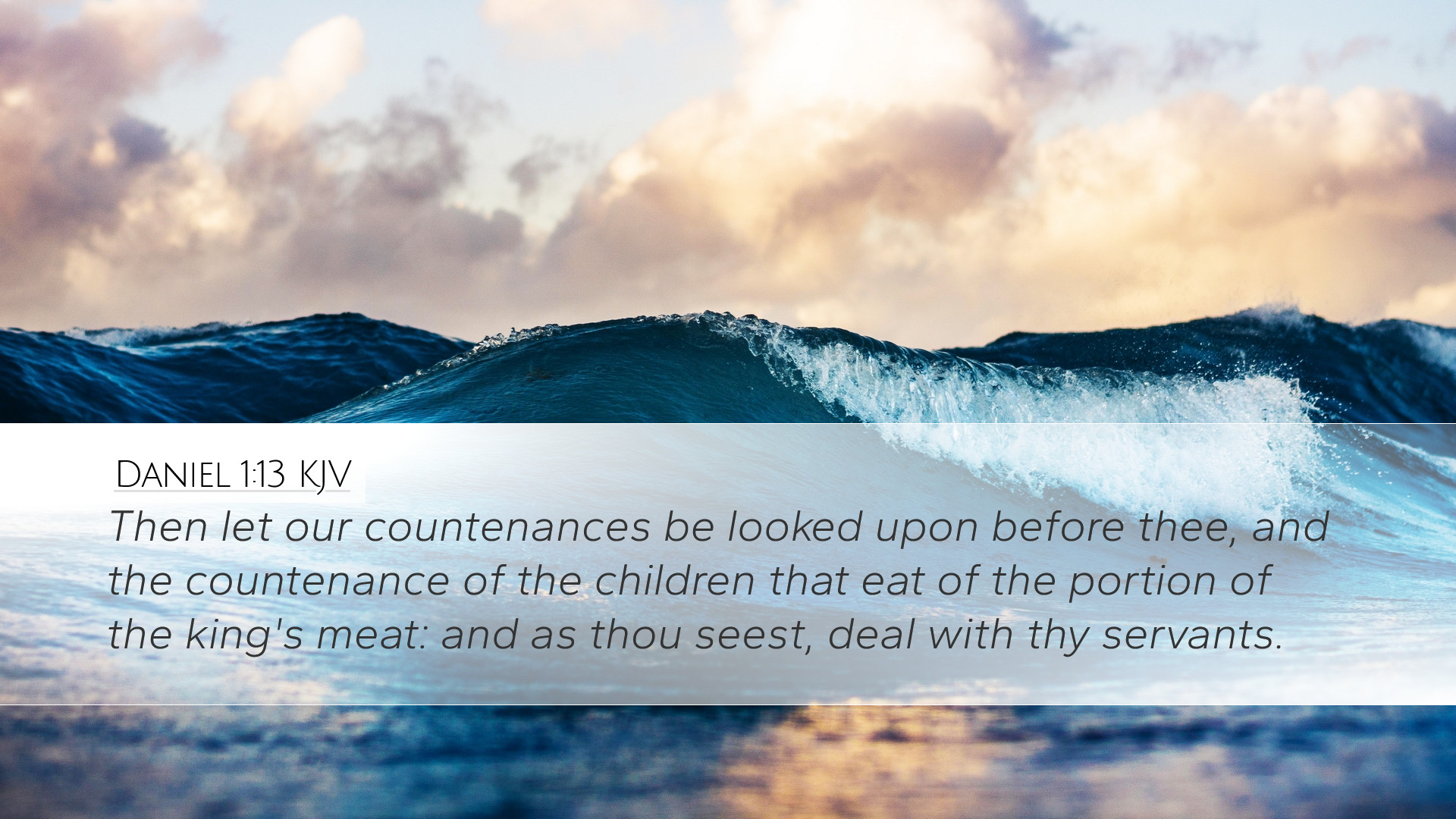Old Testament
Genesis Exodus Leviticus Numbers Deuteronomy Joshua Judges Ruth 1 Samuel 2 Samuel 1 Kings 2 Kings 1 Chronicles 2 Chronicles Ezra Nehemiah Esther Job Psalms Proverbs Ecclesiastes Song of Solomon Isaiah Jeremiah Lamentations Ezekiel Daniel Hosea Joel Amos Obadiah Jonah Micah Nahum Habakkuk Zephaniah Haggai Zechariah MalachiDaniel 1:13
Daniel 1:13 KJV
Then let our countenances be looked upon before thee, and the countenance of the children that eat of the portion of the king's meat: and as thou seest, deal with thy servants.
Daniel 1:13 Bible Commentary
Commentary on Daniel 1:13
Daniel 1:13 states:
“Then let our appearance be examined before you, and the appearance of the young men who eat the king's delicacies; and as you see fit, so deal with your servants.”
This verse encapsulates a significant moment in the narrative of Daniel, where he courageously proposes a test of diets that emphasizes his commitment to his faithfulness to God, even in a foreign land. The verse presents several themes that merit deep reflection.
1. Contextual Background
The setting of this verse is in Babylon, where Daniel and his three friends have been taken captive. They are offered the royal diet, rich and luxurious, reflecting the lavish lifestyle of the Babylonian court. However, Daniel resolves not to defile himself with the king's food.
2. Theological Implications
Daniel's determination to abstain from the king's delicacies raises crucial theological points:
- Faithfulness to God: Daniel chooses obedience over comfort and convenience. This is echoed in Matthew Henry's commentary, which notes that Daniel’s refusal signifies a deep commitment to God's laws over the temptations of worldly influences.
- Holiness and Separation: By insisting on a diet in accordance with Jewish dietary laws, Daniel illustrates the biblical principle of holiness—being set apart for God’s purposes. Adam Clarke emphasizes the importance of being distinct in a culture that promotes contrary values.
3. The Challenge of Cultural Assimilation
The pressure to assimilate into Babylonian culture is a recurring theme in the Book of Daniel. The royal provisions represent more than just food; they symbolize the temptation to compromise one's identity and faith.
- Resistance to Influence: Albert Barnes notes that Daniel's actions serve as a model for believers facing cultural pressures. He highlights that Daniel’s request for a test is a practical approach to resist the influences without confrontation.
- Faith in Action: The passage illustrates that faith requires action. The term "appearance" places emphasis on visible outcomes of Daniel’s faithfulness. The evidence of God's favor would be seen, and their lives would testify to His provision.
4. The Test of Faith
Daniel proposes a test that ultimately reveals God's faithfulness. This introduces an important aspect of faith; it can and should be tested.
- God’s Provision: As the Israelites observed the dietary laws, the expectation was that God would sustain them. Matthew Henry comments on the miraculous nature of their health after the ten days of testing, showcasing God’s providential care for those who remain faithful.
- Results of Obedience: The outcome of the ten days is significant. Clarke mentions the striking results of their enhanced appearance and vigor, serving as a divine endorsement of their convictions.
5. Practical Applications
In light of this verse, several applications can be drawn for modern believers:
- Courage to Stand Firm: Just as Daniel stood firm in his beliefs, Christians today are called to maintain their convictions in the face of societal pressures.
- Seeking Divine Guidance: Daniel’s approach to testing his dietary choice encourages believers to seek God’s direction in their decisions and to trust in His provision.
- Living as Witnesses: The health and vitality of Daniel and his friends serve as a witness to others. Their lives testify that faith and obedience to God result in blessed outcomes.
6. Conclusion
In conclusion, Daniel 1:13 is not merely a dietary challenge; it is a profound declaration of faith amidst a challenging culture. The insights drawn from public domain commentaries remind us of the significance of standing firm in our commitments to God. As pastors, students, and theologians, let us be inspired by Daniel's example, knowing that our obedience has both spiritual and practical implications in our walk with God.


